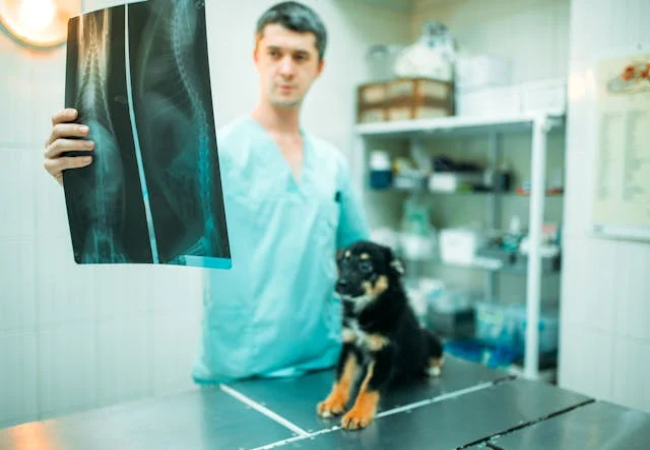Myoclonus in Dogs – Vet‑Led Guide 2025 🐶⚡

In this article
🩺 Myoclonus in Dogs – Vet‑Led Guide 2025 🐶⚡
By Dr. Duncan Houston BVSc
Hello, I’m Dr Duncan Houston, BVSc, founder of Ask A Vet. Myoclonus—those sudden jerks or twitches—is a neurological condition that can range from benign to serious. This 2025 guide explores what it is, what causes it, how we diagnose and treat it, and ways to support your pup at home. Let’s provide clarity and comfort. 🧠❤️
📘 What Is Myoclonus?
Myoclonus describes sudden, brief, involuntary muscle jerks, often rhythmic and repetitive, involving parts or groups of muscles at rates up to 60 times per minute . Dogs stay fully conscious during episodes—which differentiates it from generalized seizures.
🚩 Common Causes & Risk Factors
- Canine distemper virus: the most frequent cause—"distemper myoclonus"—often after respiratory/GI signs.
- Genetic/idiopathic forms, such as Lafora disease in Dachshunds, Beagles, Mini wire‑haired Dachshunds, or juvenile myoclonic epilepsy in young dogs.
- Structural neurological issues: brain inflammation, tumors, metabolic disease.
- Drug/toxin reactions: e.g., tramadol, opioids, lead poisoning.
- Benign idiopathic jerks: such as reflex head twitching in Labradors.
🐾 Recognizing Signs & Types
- Rhythmic muscle jerks—could be head, limb, or full-body.
- Consciousness is maintained—dogs remain alert.
- Triggers: startle, lights, sudden noise in some cases.
- Breed-specific patterns—such as senior Cavalier King Charles Spaniels with head tremor & seizure‑like jerks.
🔬 How We Diagnose It
- Home videos: Recording episodes is valuable.
- History & exam: Vaccination, onset, neurological assessment.
- Bloodwork/urinalysis: Identify metabolic or toxic causes.
- Advanced diagnostics: MRI, CSF tap to detect distemper, inflammation, or structural lesions.
💉 Treatment Options
1. Manage the Underlying Cause
- Distemper: supportive care, anti-inflammatories—prognosis poor if chronic .
- Metabolic/toxin causes: correct deficiencies or remove toxins .
- Brain disease/tumors: treat inflammation, surgery, or chemo if indicated.
2. Seizure Control (if needed)
While anticonvulsants like phenobarbital, levetiracetam, clonazepam, or valproate may help, their effectiveness in canine myoclonus varies—with cautions around side effects like sedation .
3. Symptomatic & Supportive Care
- Anti-inflammatories for distemper-related inflammation.
- Environmental control: reduce triggers—bright lights, loud noise.
- Comfort: soft bedding, gentle routines.
- CBD/calming supplements could help nervous dogs—discuss with your vet.
📅 Prognosis & Outlook
- Distemper myoclonus: generally poor prognosis—chronic neurologic decline is common .
- Idiopathic & breed-specific types: often benign—many dogs maintain active, happy lives .
- Lafora & juvenile epilepsy: may progress despite therapy; supportive care and seizure management crucial .
- Metabolic/toxin forms: often reversible with timely intervention .
🏡 At‑Home Care & Quality‑of‑Life Tools
- Record episodes to monitor changes.
- Create calm, low‑stimulus environments.
- Maintain consistent feeding, medication schedules.
- Use soft bedding, avoid slippery floors, and provide gentle toys.
- Offer supplements like omega-3s, CBD, and anxiety relief when safe.
- Check-ups: perform regular physical exams and bloodwork.
🐾 Integrating Ask A Vet
Observe a twitch? Check in with Ask A Vet for guidance on episode tracking, dosage questions, or signs of progression. Together, we're here for both mind and muscle. 💕
✨ Key Takeaways
- Myoclonus is involuntary muscle jerking—can be benign or signal a serious neuro illness.
- Distemper is the most common cause; genetic, idiopathic, metabolic and toxin causes also occur.
- Diagnosis relies on history, exam, labs, imaging, and occasionally CSF analysis.
- Treat underlying conditions, limit triggers, and manage seizures if needed.
- Home environment, gentle routines, and supportive tools improve well‑being.
- Early intervention is key—when in doubt, connect with your vet or Ask A Vet. 🐾
Witnessing myoclonus can be concerning, but understanding it helps. Reach out to your vet or Ask A Vet for help—let’s ensure comfort, clarity, and confidence together. 🐾❤️






